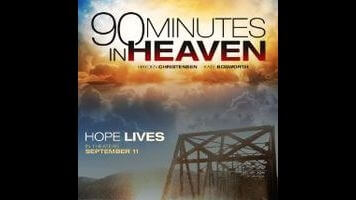The biggest surprise about 90 Minutes in Heaven is how borderline secular it is. Jesus is semi-regularly invoked, and prayer for Don a constant. But if you cut out those scenes and references, you’d be left with a professionally assembled, still-overlong feature-length movie about a guy who, following a horrific accident, retreats into sullen post-traumatic silence. He treats his wife with great indifference until he’s told to “get your act together” by a well-meaning friend, pastor and mentor Jay B. Perkins (Fred Thompson). Don’s 90 minutes in heaven are closer to five onscreen, and those visions are held back like the shadowy monster of a cheap B-movie who’s repeatedly concealed to save money. What we finally see—a sea of happy white people and two token black ones against a backdrop of clouds and blown-out light—is so thoroughly underwhelming you wonder why Polish bothered. The effect is rendered even more ridiculous by a change from the 1.85 format for the real world to 2.35 widescreen for heaven; what’s on-screen is neither epic nor panoramic, and makes the whole movie seem letterboxed in the theater.
Theoretically, it’s refreshing that a Christian film elides the usual pseudo-fiery agenda-setting in favor of a naturalistic portrait of a couple’s difficulties, where religion is an underlying constant but not the sole topic of discussion. Yet while 90 Minutes In Heaven has a professional sheen miles above the clunky products peddled by PureFlix (God’s Not Dead) and their ilk, that just makes it duller. The screenplay is full of infelicitous dialogue far from a plausible vernacular, which wouldn’t matter if the movie had an ounce of stylization to justify its fourth-grade-reading-level airport-novel vocabulary. For example: Cruelly cut off from an emotionally unavailable Don, Kate stares out at a skyline topped by holiday fireworks. Don, in voiceover: “Unfortunately, those were the only fireworks left in our marriage.” Christensen gives a credibly physical performance, while mostly laid up in bed, but flubs all the vocal components; cut from the soundtrack and laid over porn, his pants and screams of agony would be taken for straight-up orgasms. Bosworth delivers a monolithic portrait of a troubled wife in pain, drawing on the most standard tropes of the part: a single tear falling here, a pained whisper there.
The main non-theological points of 90 Minutes In Heaven include: Our health-care system is problematic (the bills pile up, and how they’re paid is never resolved); husbands should be nice to their wives; and McDonald’s is a terrific place to eat. The family embarks on many drive-through visits, and at one point Eva takes the kids inside; bored viewers will notice that the luscious-looking burgers, looking totally unlike anything ever served up by the chain in real life, are left conspicuously uneaten by the kids as they tuck into the fries, presumably because they’re inedible prop food. A faint sense of hucksterism lurks over the dull product, which is selling the vague promise that regular prayer guarantees eventual admission to “the greatest family reunion,” in Piper’s voiceover words.
Real-life Pastor Don delivers a sermon regarding his experience at the closing, but his words offer no real sense of urgency or theological fervor. This, perhaps, is why the Southern Baptist Convention issued a resolution last year against these types of books, saying they contain details “antithetical to scripture” and decrying how “many devout and well-meaning people allow these to become their source and basis for an understanding of the afterlife rather than scriptural truth.” Such watery affirmations have little to do with the Bible, which is true of this movie despite its occasional religious lip service.








































